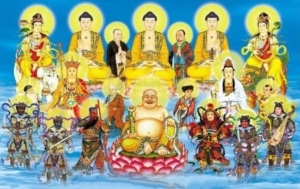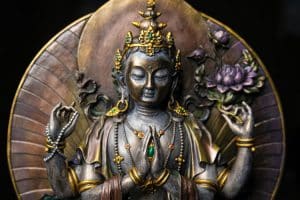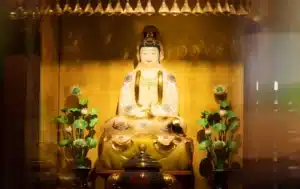The Ksitigarbha Sutra is an ancient and revered text in the Mahayana Buddhist tradition that has inspired countless generations of practitioners. This sutra tells the story of Ksitigarbha Bodhisattva, a compassionate and courageous bodhisattva who made great vows to rescue sentient beings from the depths of hell.
At Lotusbuddhas.com, we recognize the profound teachings of the Ksitigarbha Sutra and its importance in Chinese Buddhism.
We believe that the Ksitigarbha Sutra offers a wealth of timeless wisdom and practical guidance for all those who seek to walk the Buddhist path. Whether you are a seasoned practitioner or just beginning your journey, the Ksitigarbha Sutra has much to offer. Join us as we explore the teachings of this profound sutra and discover the transformative power of compassion and wisdom.
The Origin of the Ksitigarbha Sutra
During the Tang dynasty in the 7th century AD, the Ksitigarbha Sutra was first translated from Sanskrit into Chinese by the highly regarded scholar, traveler, and translator Xuanzang.
Xuanzang’s significant contributions to Chinese Buddhism include his travelogue documenting his journey to India between 629-645 CE, his dedicated efforts to bring more than 657 Indian texts to China, and his translations of several of these texts.
In addition to the Ksitigarbha Sutra, Xuanzang also produced fresh translations of the Avataṃsaka Sūtra and the Laṅkāvatāra Sūtra for Chinese Buddhism during the same period.
Despite Xuanzang’s renown, some experts have raised doubts about the origin of the Ksitigarbha Sutra, as no Sanskrit manuscripts for the sutta have been found. The inclusion of filial piety in the text has fueled suspicion that the sutra may have originated in China, as filial piety is commonly associated with Chinese culture.
However, other scholars, such as Gregory Schopen, argue that filial piety is also a tradition in Indian Buddhism. At present, there is insufficient evidence to determine whether the Ksitigarbha Sutra originated in India or China. In Vietnam, the most popular version of the Ksitigarbha Sutra is that of the late Venerable Thich Tri Tinh.
The Meaning of Ksitigarbha Sutra

There are a total of thirteen chapters in the Ksitigarbha Sutra and are divided into three parts. The discourse is presented in the form of a dialogue between the Buddha and Ksitigarbha. It takes place in the Trāyastriṃśa heaven, located atop Mount Meru, in front of countless sentient beings.
The text includes stories of Ksitigarbha’s method of liberating sentient beings from hell, and instructions on how to dedicate merit to the dying and the deceased.
This sutra has many aspects for Buddhists in various situations. For example:
- The Ksitigarbha Sutra is concerned with leaving the sea of suffering, achieving the happiness of Nirvana, and attaining Buddhahood.
- The sutra is related to the Law of Cause and Effect, describing the consequences of one’s actions, whether good or bad.
- The sutra also discusses filial piety, not only between children and their parents but also as a rule of obligation and common responsibility for all sentient beings.
In chapter 13 of the Ksitigarbha Sutra, the Buddha discusses 28 benefits that “any good man or woman who sees the image of Ksitigarbha and hears this sutra, furthermore reading and chanting it, and who offers incense, flowers, drinking water, food, clothing, and precious jewels as offerings, while praising and respecting Ksitigarbha Bodhisattva” will receive.
The meaning of the Ksitigarbha Sutra is that all sentient beings can eliminate greed, hatred, and delusion in their minds by practicing the three good karmas, which will stop the cycle of rebirth and eliminate ignorance. Ultimately, they will return to the Ksitigarbha Bodhisattva within themselves.
28 Benefits of Reciting the Ksitigarbha Sutra
- They will be protected by heavenly elves and heavenly dragons.
- They will develop their minds day after day.
- They will accumulate transcendent wisdom.
- They will never retreat from Bodhi.
- The food and clothes are always luxurious.
- They will never get any disease.
- They will keep away from floods, fires and disasters.
- They will not be robbed.
- They will be respected by everyone.
- Gods and ghosts will help and support them.
- A woman can be reborn as a man in the next life.
- A woman can be born as the daughter of a king.
- They are born with good looks.
- They will be reincarnated to heaven.
- They can be reincarnated as kings.
- They will be aware of their previous lives.
- They will get whatever they ask for.
- Their family and loved ones will be very happy.
- All calamities and accidents will be eliminated.
- They will be free from all bad karma.
- They will go anywhere without a hitch.
- They will have calm and peaceful dreams.
- Their deceased loved ones will no longer suffer.
- They will receive blessings from their previous lives.
- They will be praised by the Buddhas and Bodhisattvas.
- They will become intelligent and of good origin.
- They will possess a kind heart.
- They will eventually realize Buddhahood.
Some notes when reciting the Ksitigarbha Sutra
Like many other sutras, chanting the Ksitigarbha Sutra also needs to be sincere and with certain precautions. A few specific notes are as follows:
- Anyone can read the Ksitigarbha Sutra on their own because it is suitable for all sentient beings. You can learn and read to move towards a more benevolent and filial mind.
- The Ksitigarbha Sutra is a rather profound sutta with many layers of meaning that you don’t have to read through a few times to understand and remember it all. Therefore, you should spend time every day reading and reciting the teachings of the sutras.
- You can read sutras at home, temple or anywhere as long as the place is quiet, dignified, not noisy, unclean. However, it is best to chant at the temple to be able to fully grasp the meaning of the sutta. Because the temple is always a solemn place, and there is a monk to teach.
- When reading sutras you need to keep your mind pure, sincere and focused, you must not let external factors dominate. So when really focused, comfortable should chant.
- Before chanting, it is necessary to prepare neat, clean, fragrant clothes, do not wear short and too colorful clothes. Gargle with scented water, wash your hands thoroughly, and bathe before chanting.
- You always keep your back straight, the volume of the prayer is just enough to listen to. The Ksitigarbha Sutra is also recited at funerals, not only in temples, as a way to direct the mind of the deceased into samsara without attachment to the world.
The Ksitigarbha Sutra – a Buddhist sutra that helps us to eliminate anger, delusion, and greed, brings good direction for a peaceful and lucky life. The suttas are profound teachings, which Buddhists should practice to gain much benefit.
Who is Ksitigarbha Bodhisattva?

Ksitigarbha Bodhisattva is built with the image of the right hand holding a staff, the left hand holding a pearl, a gentle face. He is the theory of using a staff to break hell to rescue sentient beings – who often chant his name.
“As long as hell is not empty, I vow not to become a Buddha, only after all sentient beings are saved will I myself realize Bodhi.” Vows of Bodhisattva Ksitigarbha.
So what’s the truth about breaking hell of Ksitigarbha Bodhisattva?
Some people think that there will be no force to break the hell door to rescue sentient beings, but hell here is the “mind” of each person, which is unwholesome and greedy.
Therefore, a cultivator must realize the Tathagata’s self-nature to break through hell. There will be no bodhisattva who can erase your mistakes, if so, you will rely on other forces and ignore the inherent law of cause and effect. That is, it is not that you keep doing evil deeds, you are greedy, you will be saved by Ksitigarbha. It all depends on you, on your own mind.





